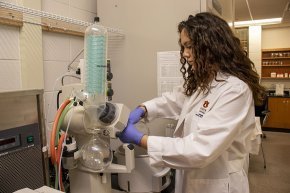
Full circle in research and discovery
From her first semester majoring in medical studies at Lenoir-Rhyne to her current term as a Ph.D. candidate studying medical chemistry at Auburn University, Kabre Heck ’19 has pursued an academic path marked by scientific inquiry, professional accolades and self-discovery.

“I’ve reached a place in my career where I’ve found I enjoy the process, the journey, even more than the end results,” Heck commented as she prepared to embark on her final semester as a graduate assistant and researcher in Auburn’s Harrison College of Pharmacy.
Almost ten years ago, the Hickory native joined the Lenoir-Rhyne High School Scholars Academy with the long-term goal of becoming a physician assistant (PA). Proximity to her family and a generous scholarship package persuaded her to remain at LR as an undergraduate.
“I’m a first-generation college student, so affordability, student support and a smooth transition to a PA graduate program were all important factors in my decision,” Heck shared. “Everything lined up to place me where I needed to be.”
A strong foundation
The medical studies major combines intensive study in the sciences with preparation for clinical practice. Like all science majors at LR, Heck completed independent research in her senior year with Judy Moore, Ph.D., as her mentor – combining biology and chemistry in a study of the enzymes that allow the voodoo lily to generate internal heat to attract pollinators.
“I thought it was really interesting because I have a pet lizard that can’t generate his own heat, but this plant can,” Heck recalled. “More than that, it was biochemistry in the truest sense, looking at how chemistry affects biology. That was the point where I realized I wanted to focus on research in graduate school, that I preferred pure science and investigation over patient care.”

In addition to her research, Heck worked as the organic chemistry lab assistant with Joshua Ring, Ph.D., a chemistry professor who completed his doctorate in pharmaceutical science at the University of Kentucky and completed post-doctoral research at Auburn. Inspired by his example, Heck applied to those two programs.
Heck made it as far as the interview stage of the application to Kentucky but was not accepted to the program. She almost met the same outcome at Auburn, but her application caught the eye of Angela Calderón, Ph.D., a professor in the Department of Drug Discovery and Development and Heck’s current mentor.
“I actually got a rejection letter from Auburn because I’d sent an unofficial transcript instead of an official one. I was making plans to move to Raleigh and work in a lab for a year before applying again,” Heck shared. “Then a couple of days before my graduation from LR, I got an email from Dr. Calderón asking for my official transcript and arranging an interview. A month later, I was here.”
One part of Heck’s record that made a strong impression on Calderón and her colleagues at Auburn was her grounding in the fundamentals of biology, chemistry and physics as well as her experience with original research.
“I arrived with all the knowledge I needed to build from,” said Heck. “Even though I wasn’t a chemistry major as an undergrad, I still learned everything I needed to transition into a chemistry Ph.D. program.”
Natural chemistry and trendy berries
Echoing the senior research that led her to Auburn, Heck’s current research with Calderón’s team focuses on plants and enzymes – this time in a medical context.
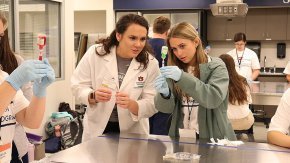
“Most researchers in medicinal chemistry are working on developing new drugs, but I do something called natural products chemistry. I study medicinal plants,” Heck explained. “Right now we’re studying açaí – which is incredibly trendy right now – and how the compounds in açaí can potentially interact with other drugs.”
Grapefruit is a common example of a natural product with negative effects on both prescription and non-prescription medication. Chemical compounds in grapefruit can block the metabolism of a variety of drugs used to treat conditions ranging from high blood pressure to anxiety to seasonal allergies. The slower metabolic rate causes too much of the medication to build up in the body, creating adverse effects. Heck is part of a team investigating whether açaí has similar effects.
Before Heck arrived at Auburn, her mentor Calderón began looking into açaí consumption among cancer patients looking to increase their antioxidant intake. Heck’s role on the team has been to look at interactions between açaí and chemotherapy.
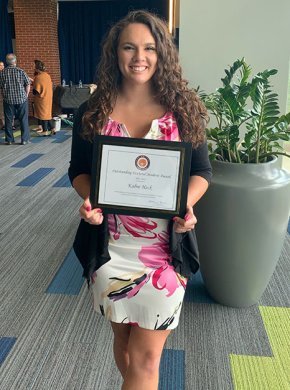
“I study different enzymes from açaí in combination with chemo drugs. When patients consume açaí – either in a capsule or a food product – it could make their chemotherapy more effective or less effective. It could cause more side effects or make existing side effects worse, and that’s something practitioners need to know,” Heck said.
In 2023, the National Institutes of Health (NIH) took notice of her work and awarded Heck a research enhancement grant, making her one of eight students in Auburn’s history and the first from the pharmacy school to earn such an honor. The grant has allowed Heck to fully focus on her research, present at conferences and remain on track to complete her Ph.D. in May 2024.
“Part of the NIH is the National Center for Complimentary and Integrative Health, and they look at medicine outside the scope of the traditional Western model – dietary supplements, meditation, mind-body studies, those kinds of treatments. One area they look at is the quality and safety of natural or botanical products, which is where my project fit in,” said Heck.
An emerging future and evolving goals
Although Heck came to Auburn with plans to become a professor and researcher, during her five years as a doctoral candidate, she has found an unexpected niche that has sparked her passion and changed her focus for the future.
“Most researchers are looking for an answer to their question. I’m not as fascinated by the answers as I am by developing the methodology to find the answer,” Heck shared.
Heck has conducted much of her açaí research using liquid chromatography-mass spectrometry to isolate and identify compounds. Using this technology has made her more aware of how other researchers could make great use of this tool, and Heck wants to show them how as a mass spectrometry chemist.

“Most researchers dislike working with instrumentation, but my favorite day is when my mass spec breaks because I have to figure out how to fix it. When you know how to fix something and take it apart, you also learn more ways that piece of equipment can answer the questions you have,” she said.
Heck recalled a conversation with microbiology professor Daniel Grimm, Ph. D., during her undergraduate research that may have planted the seeds for her current aspirations.
“Part of my senior project with the voodoo lily was method development because I wasn’t getting the data I needed, so I had to change my approach,” Heck recalled. “Dr. Grimm explained to me then that some people make their whole careers helping researchers figure out how to answer their questions – so now it feels like I’ve come full circle.”
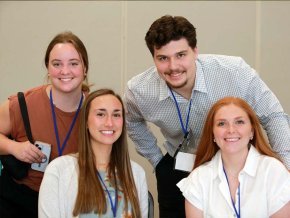
Lenoir-Rhyne University students showcased their academic excellence and research expertise at the 2025 North Carolina Academy of Science (NCAS) annual meeting in late March.
View More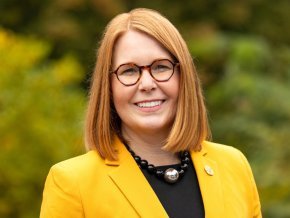
Lenoir-Rhyne University has selected Summer McGee, Ph.D, as the institution’s 13th president. Her appointment was enthusiastically approved by the Lenoir-Rhyne Board of Trustees after a national search.
View More